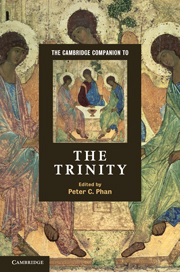Book contents
- Frontmatter
- Contents
- Notes on contributors
- Preface
- Part I Introduction
- Part II Retrieving the sources
- Part III Renewing the tradition
- 6 God as the mystery of sharing and shared love: Thomas Aquinas on the Trinity
- 7 The Trinity in Bonaventure
- 8 The Trinity in the Protestant Reformation: continuity within discontinuity
- 9 Between history and speculation: Christian trinitarian thinking after the Reformation
- Part IV Contemporary theologians
- Part V In dialogue with other religions
- Part VI Systematic connections
- Index
- References
6 - God as the mystery of sharing and shared love: Thomas Aquinas on the Trinity
from Part III - Renewing the tradition
Published online by Cambridge University Press: 28 July 2011
- Frontmatter
- Contents
- Notes on contributors
- Preface
- Part I Introduction
- Part II Retrieving the sources
- Part III Renewing the tradition
- 6 God as the mystery of sharing and shared love: Thomas Aquinas on the Trinity
- 7 The Trinity in Bonaventure
- 8 The Trinity in the Protestant Reformation: continuity within discontinuity
- 9 Between history and speculation: Christian trinitarian thinking after the Reformation
- Part IV Contemporary theologians
- Part V In dialogue with other religions
- Part VI Systematic connections
- Index
- References
Summary
No trinitarian theology has exercised as much influence on Catholic theology as has that of St. Thomas Aquinas, yet no trinitarian theology has proven as difficult to comprehend either. In this chapter I begin with the ontological constitution of the Trinity in terms of processions, relations, and persons. I then go on to discuss the personal characteristics of Father, Son, and Holy Spirit, and the logic of the immanent processions as the grammar of God's action in the world. I will end with a brief reflection on his relation to the patristic tradition, East and West, and on his challenges to our contemporary reconstructive tasks. My presentation is largely based on his Summa theologiae (The Summa of Theology) i, qq. 27–43, and Summa contra gentiles (known in English as On the Truth of the Catholic Faith) iv, 1–26.
the ontological constitution of the trinity: processions, relations, persons
The most important systematic question of all trinitarian theology is perhaps the question concerning the origin of plurality or threeness in God, a being whose very essence is so uniquely “one” as to be “simple” in the sense of having no internal ontological composition in the way that finite entities do. How can there be three persons in the one God whose very essence is identical with his existence? How does one show the possibility of this plurality without falling into tritheism or modalism, the two extremes that an orthodox trinitarian theology must avoid? Aquinas takes on this question in the most orderly, systematic way. There are many steps to his answer.
- Type
- Chapter
- Information
- The Cambridge Companion to the Trinity , pp. 87 - 107Publisher: Cambridge University PressPrint publication year: 2011
References
- 1
- Cited by



